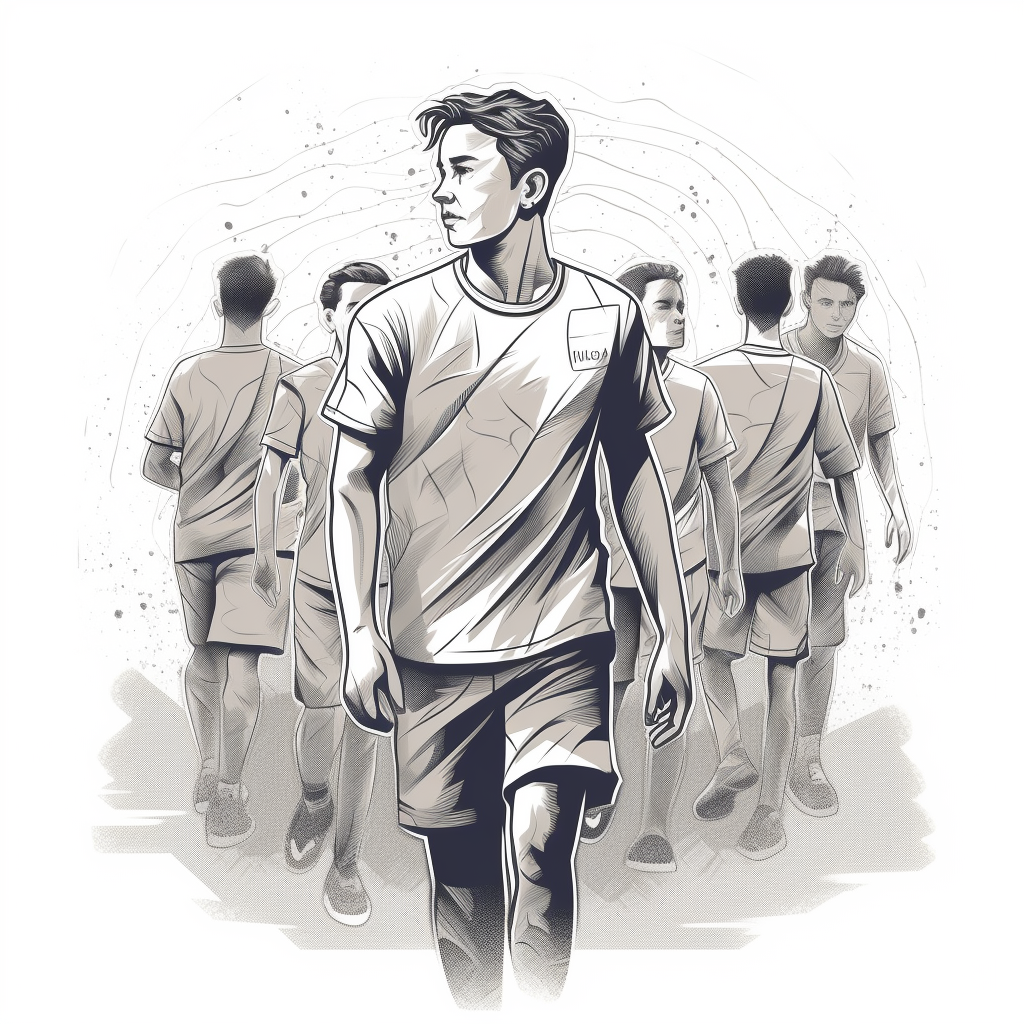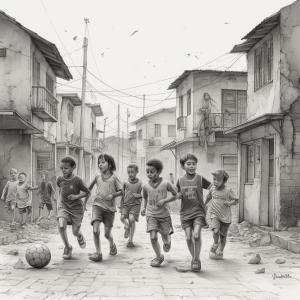
Soccer intelligence is not just a skill…
It’s a sophisticated, complex framework that involves mental agility, emotional resilience and strategic thinking.
In soccer…
Soccer intelligence manifests as an intuitive understanding of the games flow and a deep connection to the rhythm and pace of the game.
Without a shadow of a doubt…
Soccer intelligence transcends basic physical prowess.
In soccer…
…and in life, intelligence is about understanding the interconnectedness of actions and reactions.
It’s about being ahead of the game and your opponent and having the mental flexibility to adapt strategies as the game unfolds.
A high level of soccer IQ elevates players from mere participants to architects of the game… enabling them to exert a level of control and influence that is both subtle and profound.
A Journey beyond Physicality
Soccer intelligence refers to a player’s ability to understand, interpret and react to the game’s dynamics.
Soccer IQ encompasses the following 6 key aspects.
Spatial Awareness: This involves understanding one’s position relative to the ball, teammates, opponents, and the boundaries of the playing field. It allows players to make effective decisions about movement and positioning.
Game Understanding: This is about knowing the rules, tactics, and strategies of soccer. It includes the ability to read the game, anticipate the flow of play, and understand the strengths and weaknesses of both one’s own team and the opposition.
Decision-Making: This is the ability to quickly and effectively decide what action to take in any given situation. It could be choosing when to pass, shoot, or dribble, as well as understanding when to apply pressure or fall back in defence.
Vision and Creativity: This involves seeing opportunities that others might not, such as a pass that can split the defence or an unconventional move that can outwit an opponent. It often manifests in players who are able to “think outside the box.”
Adaptability: This is about adjusting one’s style of play to different opponents, teammates, and situations. An intelligent player can modify their approach based on the context of the game.
Communication and Leadership: While not always spoken about, the ability to effectively communicate with teammates, offering instructions or encouragement, is a sign of soccer intelligence. This also ties into leadership qualities on the field.

Spatial Awareness- The Art of Positioning and Movement
Spatial awareness is not a physical attribute but a mental one.
It embodies the connection between the mind and the body and the space they occupy.
Consider spatial awareness as a form of mindfulness in motion. It’s the ability to be completely in the moment whilst deflecting and ignoring the abuse hurled from the sidelines.
Soccer players with spatial awareness perceive things as they could be as opposed to as they are.
This heightened sense of awareness allows them to navigate the field with a sense of purpose and precision…turning the chaos of a soccer match into a structured- harmonious flow of skill and strategy.
Game Understanding- The Chessboard of Soccer
Understanding the game goes far beyond the rules and regulations.
It’s an art form…
A strategic depth that separates the good players from the great.
This aspect of soccer intelligence is akin to a grandmaster playing chess. It’s about seeing the ground, understanding every move and its consequences and having the ability to think several steps ahead.
Game understanding in soccer involves a blend of tactical knowledge, situational awareness and psychological insight.
It’s about recognising patterns in play…
…anticipating the opponent’s moves and adapting your game in real-time.
Players with high soccer IQ can read the game as it unfolds, making decisions that often seem prophetic.

Soccer Intelligence- Tactical Knowledge
Tactical knowledge is the foundation of game understanding.,
It involves various formations, strategies and styles of play.
This isn’t just about memorising drills, it’s about internalising the principles that govern the game.
It’s understanding when to press, when to play low block and when to keep possession versus a quick counter attack.
Soccer Intelligence- Situational Awareness
Situational awareness in soccer is about being aware of the game’s context.
The score…
The time remaining…
The strengths and weaknesses of teammates and opponents and even external factors like weather conditions.
Great players use this awareness to make split-second decisions that are crucial in high pressure situations.
It’s about knowing when to take risks and when to play it safe.
Soccer Intelligence- Psychological Insight
It’s about reading body language…
It’s about observing your opponent gasping for air as he tries to recover.
It’s about targeting players who may be unfit, slower and have already started waving the white flag.
Game understating in soccer is a multi- dimensional skill that requires tactical knowledge, situational awareness and psychological insight.
It transforms players from mere participants to thinkers and potential match winners.
Decision Making- The Art of Soccer Smarts
Decision making in soccer occurs in a fraction of a second.
Players must constantly assess the situation, weigh their options, and choose the best course of action.
This might involve deciding when to pass versus when to take a shot at goal, or choosing to tackle an opponent versus holding position.
These decisions are not just based on the player’s current situation but also on their anticipation of how the play will unfold.
An essential aspect of decision making in soccer is balancing risk and reward.
Players often have to decide whether to attempt a high-risk maneuver that could lead to a goal or opt for a safer play that maintains possession.
This balance requires not only an understanding of one’s own skills and limitations but also an acute awareness of the team’s overall strategy and the current state of the game.
Experience plays a crucial role in decision making.
Over time…
Players accumulate a wealth of knowledge about different game situations and how to handle them.
This experience, combined with a player’s intuition, enables them to make decisions that may seem intuitive or instinctive but are actually grounded in a deep understanding of the game.
Developing decision-making skills in soccer involves both practice and reflection.
Players improve not just by playing the game but also by analysing their performance afterwards.
Understanding why certain decisions were made and their outcomes is crucial for growth.
Additionally, watching and learning from other skilled players, whether in matches or through game footage, can provide valuable insights.

Vision & Creativity- The Canvas for Soccer Brilliance
This aspect of soccer intelligence is about seeing the game not just for what it is, but for what it could be.
It’s the ability to envision and execute plays that others don’t even see coming, a blend of imaginative flair and practical execution that turns the soccer field into a canvas for artistic expression.
Vision in soccer is about more than just physical sight.
It’s a mental skill, involving the ability to perceive the entire field, to understand the positioning and movement of players, and to anticipate how the game will unfold.
Players with great vision are always several steps ahead.
They can spot gaps in the defence, predict the movement of their teammates, and see opportunities for advancing the ball that others might miss.
Their ability to visualise different scenarios and couple them with creative execution is what makes them invaluable.
They’re not just playing the game; they’re redefining it, moment by moment.
Developing vision and creativity involves a mix of natural talent and dedicated practice.
It requires a deep understanding of the game, but also the freedom to experiment and take risks.
Coaches play a crucial role in nurturing these skills, encouraging players to trust their instincts and think creatively.
Adaptability
Adaptability in soccer is the skill that enables players to thrive in the face of the game’s constant fluctuations.
It’s about being versatile and flexible, able to adjust tactics, positioning, and style of play in response to different opponents, game situations, and evolving team dynamics.
An adaptable player is a coach’s asset, capable of fitting into various roles and strategies, seamlessly shifting gears to meet the needs of the moment.
This flexibility is crucial not just for individual success, but for the overall fluidity and resilience of the team.
In cultivating adaptability, players learn to embrace change rather than resist it.
This involves a keen awareness of the game’s flow and a readiness to alter one’s approach as circumstances dictate.
Whether it’s switching from offence to defence, adapting to different field conditions, or responding to a change in the opposing team’s strategy, adaptable players can pivot quickly and effectively.
This skill is honed through experience, a deep understanding of the game, and a mindset that is open to continuous learning and evolution.

Communication & Leadership
Effective communication on the field is about more than just calling for the ball; it encompasses the ability to convey strategies, offer constructive feedback, and provide encouragement in the heat of the moment.
Players who excel in communication help to create a sense of unity and purpose, ensuring that everyone is aligned with the team’s objectives and aware of their roles.
Leadership, in this context, extends beyond wearing the captain’s armband.
It’s about setting an example through one’s actions and attitude, inspiring teammates, and maintaining morale, especially in challenging situations.
Leaders in soccer are those who can motivate and uplift their team, fostering a positive and resilient team culture.
To cultivate these traits, players must develop not just their technical skills, but their interpersonal skills as well.
This involves active listening, understanding teammates’ perspectives, and communicating clearly and effectively under pressure.
Leadership is about having the confidence and emotional intelligence to guide others, coupled with the humility to collaborate and adapt.
In practice, this means leading by example, maintaining composure in stressful situations, and being a supportive presence on and off the field.
As players grow in these areas, they contribute to a stronger, more cohesive team dynamic, which is essential for achieving collective success in the sport.
Conclusion
Soccer intelligence is a multifaceted and dynamic aspect of the game that extends far beyond physical skills and technical abilities.
It encompasses spatial awareness, game understanding, decision-making, vision and creativity, adaptability, and communication and leadership.
Each of these key aspects contributes to the overall effectiveness and brilliance of a player on the field.
Aspiring players and coaches alike should focus on developing these aspects to achieve a higher level of play and understanding of the beautiful game.



The best article on soccer intelligence on the web. Thank you for defining and explaining what soccer intelligence entails.